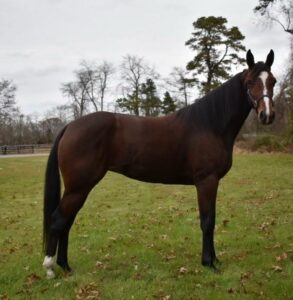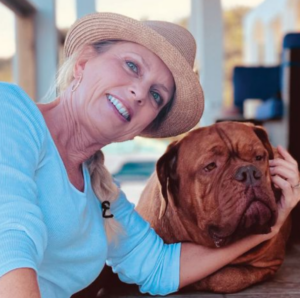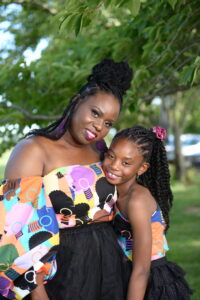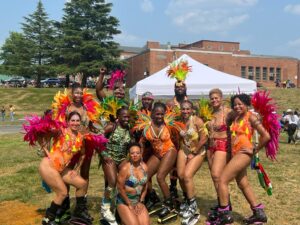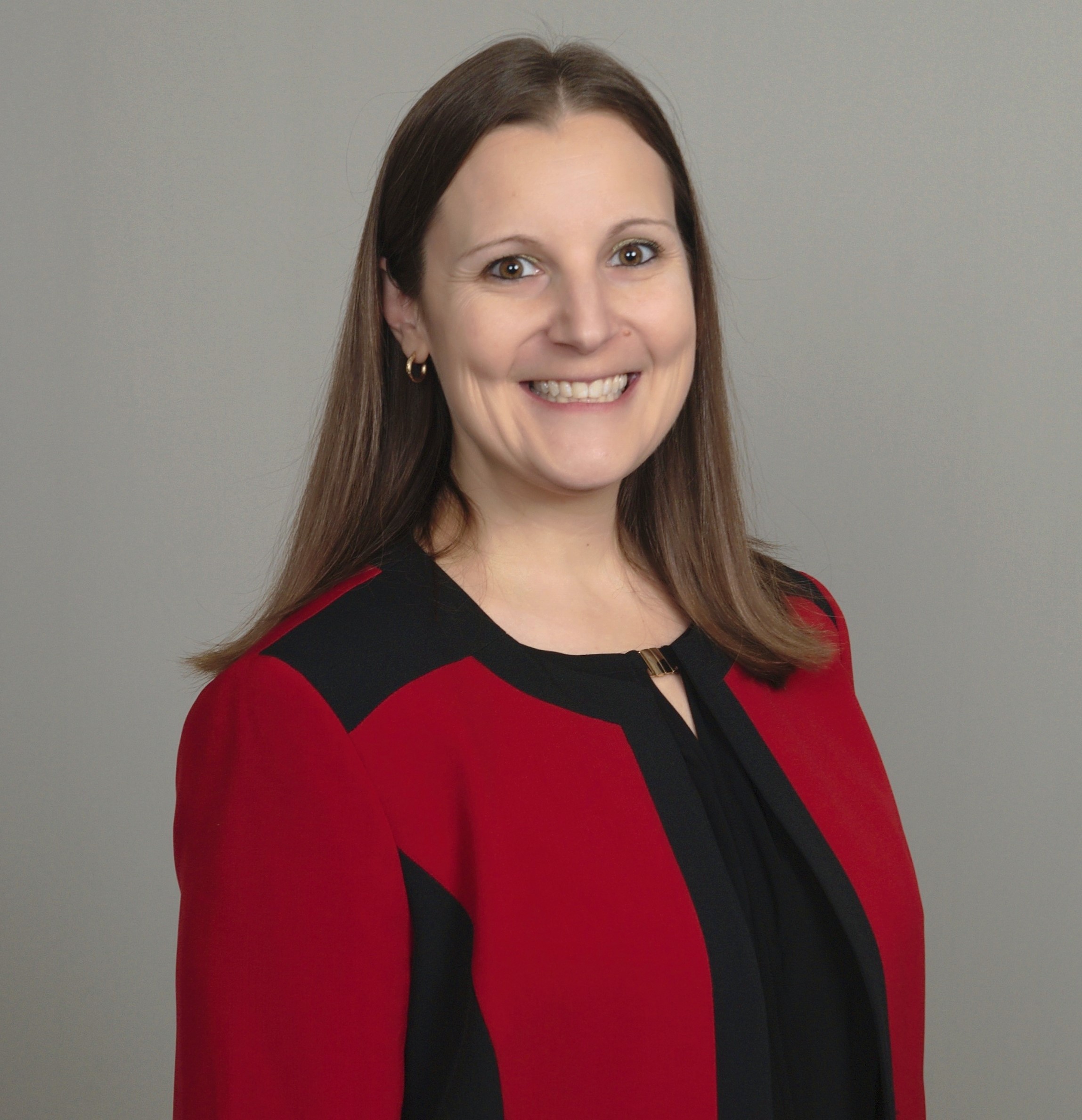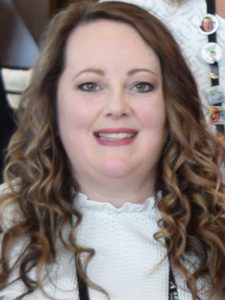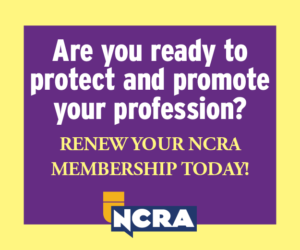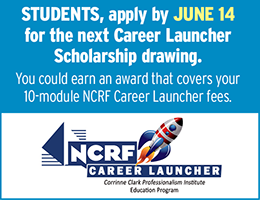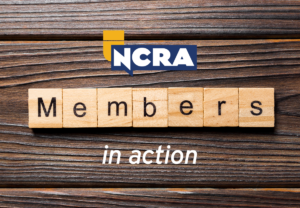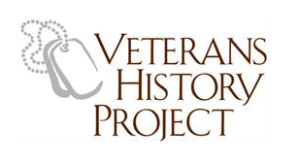When we think of couples, more than a few come to mind. Lucille Ball and Desi Arnaz. Sonny and Cher. John Lennon and Yoko Ono. In the court reporting world, we have several couples who have captured the spoken word — and each other’s hearts. Some have met while on the job, others through mutual friends, and some even while visiting an online forum. Whether they’ve been together for decades or just met within the past few years, these court reporting couples have made a mark in the industry and have been there for each other along the way.
Louise Becker and Tim Regis
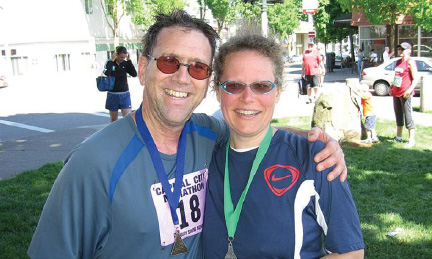
Louise Becker, RMR, CRR, CBC, CCP, and Tim Regis, RPR, met when they were in court reporting school in 1988. Becker started freelance reporting in 1990 and is a broadcast captioner for her local ABC affiliate. Regis, who currently works as an official court reporter at his local courthouse, followed Becker’s footsteps by joining the profession in 1993. Looking back, they realized they had a lot in common, such as a similar sense of humor, religion, work ethic, and financial compatibility.
In Becker and Regis’s case, the advantages of being in the same field are numerous. They mention that even though the economy has been unstable for the past few years, their jobs have been fairly stable. With Regis working as an official reporter, he’s able to get benefits and regular income. Since Becker is self-employed, she can take advantage of certain tax benefits, such as contributing to a 401k or an IRA.
But there are also a few disadvantages. Regis says, “When both of us worked as freelance reporters, it was pretty tough financially because we were either both busy or both slow because of the feast-or famine nature of freelance reporting. That was one of the reasons why Louise switched to broadcast captioning in 1995.” And they mention one other issue — their work schedules. Since TV is 24/7, Becker often works evenings, weekends, and holidays, whereas Regis has more of a 9-to-5 work schedule except for transcripts.
Neither one has ever considered leaving the field, but they do mention there are good days and bad days. Becker says, “Except for other reporters, no one really understands how this job works, so it’s nice for Tim to be able to complain about fast-talking attorneys who refuse to slow down, and I can complain about technical problems. And the conversation stays at home.”
When asked what words of wisdom they’d give other couples in court reporting or ones who were entering the field, they say, “Celebrate the milestones with a pat on your back. Don’t let others put you down or discourage you. Take criticism in a constructive way and use it to improve your skills.” They talk about the future of court reporting: “We’re hopeful that our jobs will take us into retirement. Folks have been saying our industry was a dying profession for years, going back to the invention of the tape recorder, but we’re still here and able to make a comfortable living.”
Gene and Jo Ann Betler
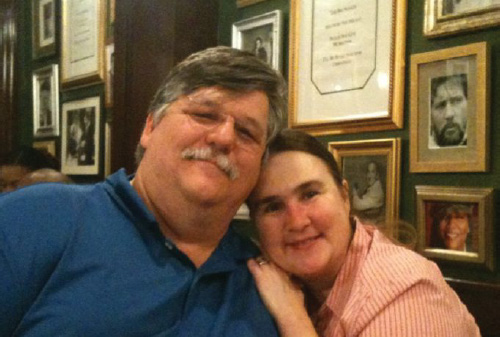
Gene Betler, CLVS, and Jo Ann Betler, RDR, CRR, CBC CCP, CPE, CLVS, from Huntington, W.Va., met in September 1990. It seems they agree on one aspect of their introduction — the actual date they met. The rest tends to change depending on whom you ask. Gene insists that Jo Ann sent three of her friends to kidnap him and bring him down to Huntington to meet her. Jo Ann offers a slightly different recollection: “A co-worker of mine was dating a friend of his. On a Saturday night of dancing, he and I were introduced.” Jokingly, Jo Ann adds she was having a weak moment. “He’s like that puppy you let in the door. After a while, you realize that he’s here to stay.”
Jo Ann, who has been in the field since 1982, has always loved court reporting. And having Gene in the field to lean on has been great. She adds, “Knowing that I have his support when I look at improving myself professionally is a great comfort. The advantage of him being in the same profession is that, when I set my goals, he often can help me map my way to achieving those goals.”
Gene adds, “I believe the greatest advantage is in simply understanding what the other is going through. There are times in every relationship that stress will enter. When you work with your spouse, you really have two relationships with that person: personal and professional. This doubles your chances of stress.”
And the stress could be plenty, considering how busy they are. This couple wears many court reporting hats. In addition to owning Betler’s Reporting & Legal Video Services, LLC, Gene is a videographer, and Jo Ann is an official court reporter for West Virginia Supreme Court of Appeals as well as a freelance reporter for their firm. Gene started his second career in the legal video profession in 2007. Initially, the business was just the two of them, but it grew quickly, and their business now has a staff of 15.
Working with your spouse can be a very rewarding experience, but there has to be more. They both advise: “What you do for a living is not why you fell in love with that person. Do not make your profession all that you have in common. Keep your dreams outside of court reporting. Keep exploring the world around you and working for the day when all of this is a very pleasant memory that you still share together.”
On a final note, when asked if they’re competitive with each other, Gene responds with generous praise of his wife. “Let me think. Jo Ann Betler, RDR, CRR, CBC CCP, CPE, CLVS, Realtime Systems Adminstrator, Trial Presentation Professional. How about if I just say ‘uncle’ now and let’s move on.” Jo Ann quickly retorts, “I win!”
Dee and Jack Boenau
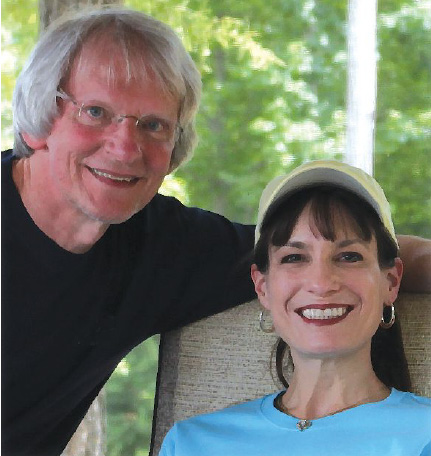
Dee Boenau hasn’t been in the field quite as long as her husband, Jack, but she still has 20 fantastic years in the business. As a realtime captioner, CART provider, and convention reporter, Dee, RDR, CRR, CBC, CCP, is also vice president of AmeriCaption, the firm Jack, RDR, CRR, CBC, CCP, founded in 1990. Jack, who has been working in the field since 1969, adds, “It was long after the rock-andchisel days but somewhat before erasable paper and electric typewriters, so during the era of reel-to-reel practice dictation tapes and carbon paper days.”
When it comes to discussing how they met, Jack recalls the exact details. “I remember this cute, professionally dressed, determined young lady coming up to me after I had presented at our state convention, asking if I was hiring.” Dee chimes in with a few more details: “I think he said no at first because I was wearing orange, which is one of the team colors of the University of Florida Gators, and he is a huge Florida State Seminole fan. It’s a good thing I didn’t tell him right away that I hold a degree from the University of Florida.”
Being together for this long in the same field has been really helpful to both of them. Jack teases Dee that she’s at least onethird computer because she understands the technology so well, but much of that is just her determination to learn.
Dee says, “We can back each other up. Jack will make me a snack and feed me if I’m captioning a meeting that’s gone through lunch and/or dinnertime. He also brings names that are ‘hot off the press’ over to my desk as I’m captioning the news. We understand the hard work and dedication the field requires and why our lives must revolve around our broadcast news, which results in some very, very long workdays.” Jack agrees, saying that having a partner who totally understands the work schedule, offers support during the occasional pitfalls, and helps to celebrate the many successes are great advantages. “While she wears the proverbial cape, I strive to hear, ‘you’re my hero!’ at least once a week,” he says.
As they talk about their competiveness, Jack brags about, of all things, his culinary skills. “She knows when to stand back and marvel … when I’m in the kitchen! But in the office, everything I accomplish, she one-ups me.” As Dee says, Jack waved the white flag a long time ago as far as competing against her on the steno machine. And Dee sees their differences as a positive thing. “Jack is a procrastinator, and I sometimes get tired of reminding him to do some things. But I always remind myself that his procrastinations combined with my get-it-done enthusiasm creates a balance.”
When asked if they have any words of wisdom to share for other couples in court reporting, Jack keeps it real and simple: “Be supportive and encouraging. It’s often little acts of kindness that help relieve the burdens of a trying day. Laughter helps. And adopt a cat! I believe one cannot be tense while watching a cat sleep by your desk.”
Ann and Breck Record
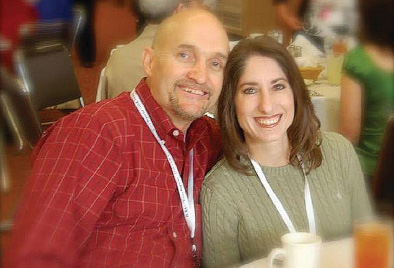
Ann Record, RPR, CRR, CMRS, and Breck Record, RMR, CRR, who met in June 2008, have actually known each other since 1996. They are both official court reporters in El Paso County, Texas. When Ann tells the story of how she met Breck, it’s as if she’d met a rock star. “I ‘met’ Breck around 1996. I’d get on the Eclipse forum to ask questions. He was always helpful. I thought, ‘What a great last name for a reporter, Record.’ We officially met in person in June 2008 at the Texas Court Reporters Association annual convention. As I was checking my email, he came up to me, sat down, and said hi. I looked at his name badge and thought, ‘Oh my God, it’s Breck Record!’ I didn’t say this out loud, though, because I didn’t want to embarrass him.”
Striking up a conversation seemed to work, because they’ve been together since. Court reporting brought them together, but as Breck says, having his wife in the same field is priceless. “I wouldn’t be what I am today without her there by my side.” Ann feels the same way: “It’s great being married to another court reporter. We always support one another. He lifts me up daily.”
They help each other out with work, such as transcript loads, which is a great advantage. Plus, they know what the other is going through when they have a good or bad day. But they say there are also disadvantages, such as when Breck is in trial, and it goes late. Since they carpool together, Ann has to wait until he’s done. Breck says, “My poor bride has to stay up here when my trials are running late. She’s a trouper in that regard.”
But it’s not — or can’t be — all about work. Breck proposes fun along the way. “Life can pass you by in an instant, and before you know it, it’s over. Always take time for your spouse, and do fun things together when you can. You can’t work all the time. When it’s slow, that’s the time to travel and get out of town and have fun.”
Adam and Pat Miller
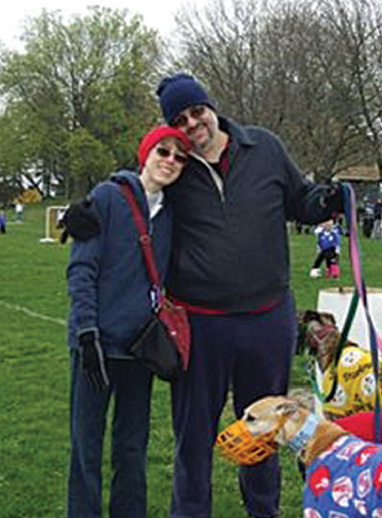
Even though a mutual friend set them up two years after meeting, Adam Miller, RPR, CRI, CLVS, and Pat Miller, CRI, CPE, caught each other’s eye in the classroom. That’s if you ask Adam. Pat says she was totally oblivious, and it wouldn’t have happened if her friend hadn’t played matchmaker. After all, it was Pat’s theory class in Philadelphia, and Adam was one of her students.
By the time they started dating, Pat was already encouraging and helping Adam get through school. Adam says, “Absolutely no one else can support a student going through steno like someone who’s been there, who knows the hardships and successes and what they mean, who knows the need for excuses and the ways to cope with regular and devastating failures and what it means to recover from them.” Pat says the same goes for getting transcripts out. “Adam knew, having been my student, that I’d work as late as necessary to get the work done.”
Currently, Adam is the managing member of Miller Verbano Reporting, and Pam is the proofreader for both partners of the business. They both love the profession and, in their words, it’s a vocation, a hobby, and a shared passion for the play of words of a living language. Even though they consider their careers a hobby, they’ve added some non-reporting interests. Pat works one morning a week as a Community Supported Agriculture worker/harvester, and they both foster greyhounds through Greyhound Pets of America Delaware. In fact, they solve and share many problems, issues, and ideas on walks with their dogs.
When asked about the future of a profession they’ve spent decades to build, they’re optimistic and realistic at the same time. “We still believe that this is the best profession there is. We see a stultifying resistance to change in many professions, certainly not just in court reporting. From making changes in the way education happens to being current with what the client needs to perform his or her profession so that a court reporter is always part of the professional team, it is up to us to design, create, and even earn a future in translating the spoken word.”
Gail and Bill Verbano
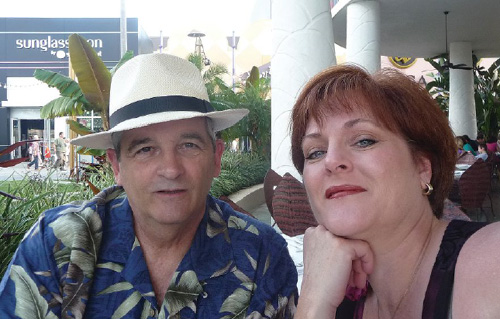
Gail Verbano, RDR, CRR, who has her name on the door at Miller Verbano Reporting, has been in the profession for close to 23 years. When she met her husband, Bill, in 1995, there was music playing. Literally. They both played clarinet in a community orchestra in San Diego. That was their common thread since Bill was in a totally different field at that time. Gail says, “When we were first married, Bill was a carpenter, and I was a reporter in San Diego. When we had children, Bill stayed home with the kids for several years.”
When they made the move to Delaware and she went into business with Adam Miller, it was a natural fit for Bill to get involved with the business. Gail says, “We got busier and needed a videographer on staff. He was looking for a new line of work and was always a photographer and audiophile. It was a natural fit. He was also interested in becoming involved with the business that had his name on it.”
But with any type of business or career, there are a couple of disadvantages. They mention that 2012 has been a very slow year. Gail says, “When I’m slow, he’s slow. When I don’t have work, he doesn’t have work.” Another problem she mentions is getting the kids taken care of. “I don’t always know when we’re going to get home from work, so the kids have learned to be pretty flexible about it. But we do need to impose on our grandma or neighbor once in a while to take our son to band practice. Or I have paid significant amounts of money to the college student up the street to make dinner for them and take my kids to piano lessons in the evening when we can’t make it in time.”
When asked if they’re competitive with one another, they say, “Never! Whether it’s court reporting or playing the clarinet, it’s something we enjoy being able to do together. We are lucky enough to be best friends and enjoy each other’s company.” You’d think spending so much time together, that when they’re not working, they wouldn’t want to talk shop. But that’s not the case. “We do a lot of asbestos work here, and some of the plaintiffs are so sick, some with young children. It’s impossible to go to their homes and see the pictures of their beautiful families on the walls and not be moved by that, and it’s impossible not to talk about it later.”
But it wasn’t always like that. When Bill was a carpenter, he didn’t know that much about being a court reporter. He didn’t quite understand why Gail had to stay late or miss the dinner party they were planning to attend or why it was so important to get that transcript done on time. Gail says, “Now that he’s in the legal field, working with attorneys and witnesses who often travel long distances or overnight, he understands the ‘let’s just finish tonight’ mentality. And it’s so nice to be able to talk about work now! I never did before because he didn’t really understand what I was talking about, what realtime meant, or why it was a special skill that required me to be there instead of someone else.”
G. Allen and Diane Sonntag
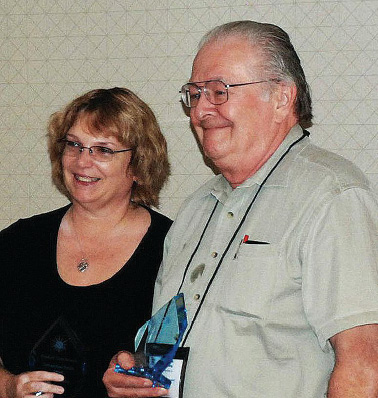
This couple’s story is about as close as you get to a romantic comedy movie script. Meet G. Allen Sonntag, RDR, CRR, and Diane Sonntag, RDR, CRR, CCP, CPE, from Arizona. Allen, a freelance reporter through Colville & Associates, and Diane, a Pima County Superior Court official reporter, met in 1994 online in the Court Reporters Forum. Diane recalls, “We met on the Sunday night chat. We spent a lot of time getting to know each other over the phone and email. I got to know the person before I met the court reporter.” The truth is they met because of court reporting, and it has been a huge part of their lives. Allen has been in the profession since 1959 and Diane since 1978, and not once have they considered leaving the profession. Diane adds, “Court reporting has been a wonderful career. It has given us a front row seat to life. We get to see the good and the bad. I prefer court because I get to see the whole case, not the bits and pieces. Allen prefers freelance because it is always different.”
But the two admit there’s a little competition in their house. Allen says, “In the past, I’ve competed in the speed contests at the state and national levels. I’ve won bronze medals in the past. She beat me in Las Vegas in 2011. Now I’ve got to get cracking and try to get back ahead of her in Nashville in 2013.”
Diane mentions how taking her married name brought about certain expectations. “I found out when I became a Sonntag that one of the requirements was to compete in speed contests. I can say it’s the most frustrating and exhilarating experience.”
Setting aside the healthy competition, the Sonntags offers some words of advice. Allen says, “You need to be flexible in your plans. Sure as you’ve made dinner or planned an out-of-town trip, one or the other will get a rush job that can’t be turned down. When the judge, lawyer, or client needs the transcript, we are duty bound to produce it, even if it’s inconvenient. In today’s economy, you need to be willing to work, provide the services, and do what is required in spite of any wishes on your part.”
Diane mentions something more personal and unrelated to the actual work: “Remember to stop and smell the flowers. This profession has been good to both of us, and I don’t think either one of us would trade it for anything. The key, though, is to make sure you have hobbies and things you enjoy that are not related to court reporting.”
